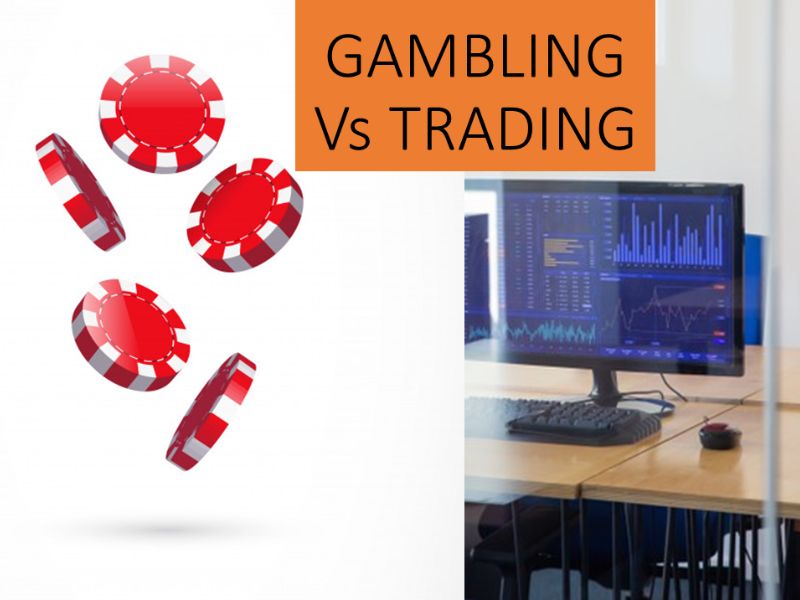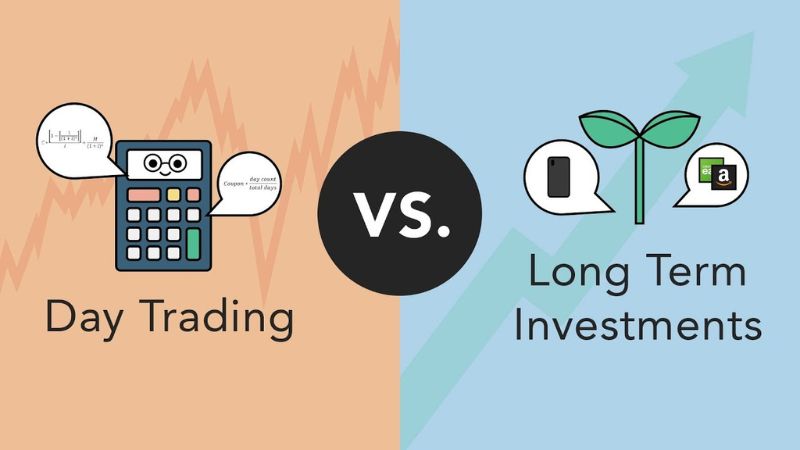Is day trading worth it from 2022? Many people like day trading because of its high profitability, however, it’s not for everyone. Whether day trading is a good idea is a very controversial issue these days. Let’s analyze all the advantages and disadvantages of this type of trading!
Is Day Trading a Good Idea?
Is day trading worth it? The essence of day trading Is that traders buy stocks at any time of the day and sell them before the market closes. This is a game that makes a profit based on the price movement of a stock in a day.
Day trading is not a suitable investment method for the vast majority of traders. Those who participate in trading are often very easy to lose because they do not really understand the core rules of this market. Statistically, over 95% of day traders lose money but they continue to ignore losses.
A major reason day trading is a bad idea has to do with trading costs. The two most intelligible transaction costs are taxes and fees known as trading commissions.
If you buy a stock and sell it before a year has passed, then any increase in the value of the stock is taxed at your ordinary income tax rate, potentially significantly higher than the tax that would apply if you held the stock for a year or more.

Depending on the trading platform you use and the type of security you are trading, you may also pay a commission every time you buy or sell a stock. These trading costs can be costly for day traders.
However, to know if day trading is worth it, we need to learn about its two advantages and disadvantages
Advantages
- Work autonomy: You can research and trade anywhere without being bound by time. You are not limited by the office or time clock.
- Avoid overnight risk: Your trade will be closed before the market closes. So no overnight risk exists. Meanwhile, your position can plummet and cause a lot of serious damage overnight with other trading methods.
- Anyone can join: You do not need to prove your ability with certificates or university degrees. There are many ways to become a professional trader such as learning, studying trading courses practicing more, etc
Disadvantages
- High Minimum Balance: Day traders need to have a minimum balance of $25,000 in their trading account at the end of the trading day. This is called the trader’s day pattern rule and it is subject to US regulation.
- Potentially stressful: The fast-paced nature of day trading can be stressful and the decision to enter or exit a trade must be made quickly. This style is not for everyone.
- Self-discipline is required: The planning and structure of your trading day are up to you. That means keeping an eye on the market, staying up to date with current events, and developing the right setups.
- Excessive trading risk: 90% of trading is psychological. Traders who lose on trade can choose to “revenge trades” to get their money back. But this can lead to a downward spiral with even more capital losses. Revenge trading (or even impulsive trading) can wipe out an account in a short period of time.
Is Day Trading Profitable?
Every job will benefit you if you work hard and take it seriously. The same goes for day trading. This is not a job for the weak to control their emotions. If you have a weak heart, it will be difficult to enter day trading successfully.
Of course, you also have to spend a lot of time to be able to participate in it. Whether you are a beginner or have a lot of experience, it is never a waste to constantly research and develop knowledge.
Is Day Trading Gambling?
Many people often compare day trading and gambling to two similar forms. Gambling is also about betting or investing money in a risky way. Meanwhile, day trading is also a form of waiting for luck, the market will increase in price according to your expectations. That is the common sentiment of most traders.
Only a handful of professionals or professional traders can win most of their day trades. These people are often very adept at accurately predicting volatile market trends in the short term. Beginner or inexperienced traders often find day trading easy to play from the first 1-2 wins. However, on the whole, these people will often lose a lot of money.
While day trading is not exactly the same as gambling, it is certainly true that most of the time, it is not very profitable.

Can You Make Money Day Trading?
Profits from day trading are often uncertain. However, when a trader is able to accurately predict market volatility, he or she can make a profit of around 6 figures. Penny stock is the type of stock that traders tend to trade the most because of its large profit potential in day trading.
On the other hand, many people still rely on luck like gambling. This is a very common situation among traders, supply is the main reason why they are most likely to lose money.
The difference between professional and amateur investors is how the money is used. Professional traders usually won’t risk their money on trades when they know the timing is right. Non-professional traders often rely more on luck.
When they lose, they will be more excited to hand over their trading in the hope of getting a return. However, it is this that makes their accounts increasingly dangerous.

How Risky Is Day Trading?
Day trading is serious business and not something you just dive into, especially if you are using a leveraged investment strategy or trading leveraged products. Day trading is not for the faint of heart as it involves minute-by-minute decision making, as well as leveraged investment strategies that can lead to significant losses.
Day trading often involves complex products and day traders often use leveraged investment strategies. If a stock price or the market moves in the wrong direction, it can lead to very rapid and significant financial loss.
Leveraged investing can even result in the loss of more money, and in some cases, substantially more than the original investment amount. Leverage-based investing in a complex and fast-paced environment can be very challenging, and it should not be done by inexperienced investors.
What Is The Difference Between Day Trading Vs. Investing?
Day Trading vs Investing are two different concepts? Investing is a broader term. It is a good form of profit from buying a stock or bond and holding them for a long time.
Long-term investors usually don’t experience the emotional swings that affect their trading as most day traders do. If you create and maintain a portfolio of low-cost exchange-traded funds (ETFs) rather than day-trading, the ability to turn profits over a long period of time will be in your favor.
Long-term holding investors are well positioned to diversify their investments and minimize the risk of large losses. Day traders buy and sell only a handful of popular stocks with much less diversified portfolios. So the volatility of any stock has a much bigger impact on their financial health.

Are Penny Stocks The Same As Day Trading?
The answer is absolutely No! Penny stocks are the names of stocks that are worth less than $5. Day trading is a form of buying and selling stocks within a day. When real day trading, many people often focus on penny stocks. However, day trading is also possible with all other types of stocks.
What Are Day Trading Taxes?
When you buy a stock and then sell it on the same trading day, you can make money. But you also owe tax on the gain, which is the price at which you sold the stock minus the original purchase price.
Generally, this tax is higher than the tax on long-term capital gains, which is levied only after the stock or other security has been in your portfolio for a year or so. Aside from the inherent risk involved, day trading is especially worthless when you factor in the significantly higher tax rates that apply to short-term trades.
The Bottom Line
In general, answering “Is day trading worth it?” depends on your vision. Day trading is very easy to make money as long as you have enough knowledge and thorough research. Otherwise, it will also destroy your wallet in a split second by ignorance. Please follow and share this knowledge if you find it useful. Read more related articles to upgrade your trading knowledge!


